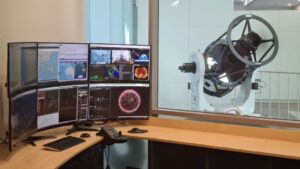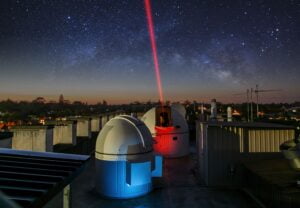Project area/S
- Engineering
Project Details
Lasers allow much greater bandwidths than radio signals, enabling ultra-precise measurements and high-speed communications to support the next-generation of pioneering space missions.
The Astrophotonics group (www.icrar.org/astrophotonics) develop technologies for high precision ground-to-space laser links. The specific project will be tailored to the skills and interests of the student, but could include: programming a robotic telescope to track satellites, drones, and other airborne targets; developing and testing optics and electronics to suppress the effects of atmospheric turbulence on the laser beam; programming FPGA modules for control and analysis of high-precision laser systems; developing software and hardware for a mobile laser terminal; or investigating the integration of optical and/or quantum communications systems with the telescopes.
The student will have the opportunity to work with the SmartSat Cooperative Research Centre, as well as both Australian and international commercial space companies and space agencies.
Student Attributes
Academic Background
Undergraduate experimental physics and optics experience preferred. Electrical engineering topics including FPGA programming or digital communications an advantage.
Computing Skills
Python, C, or Linux experience preferred.
Experience with a hardware description language (e.g. Verilog) an advantage for FPGA projects.
Training Requirement
Optics laboratory practical skills and safety procedures. Programming in Python and/or other languages.
Project Timeline
- Week 1 Inductions and project introduction
- Week 2 Initial Presentation
- Week 3 Set up optics in laboratory for prototype testing
- Week 4 Begin developing code and control systems
- Week 5 Development and testing of code and control systems
- Week 6 Initial tests of code on lab prototype
- Week 7 Refinement and testing of code and prototype
- Week 8 Obtain final results and determine remaining work and next steps
- Week 9 Final Presentation
- Week 10 Final Report

The Optical ground station for laser communication tests and telescope.

Artist’s concept of optical ground station with laser
